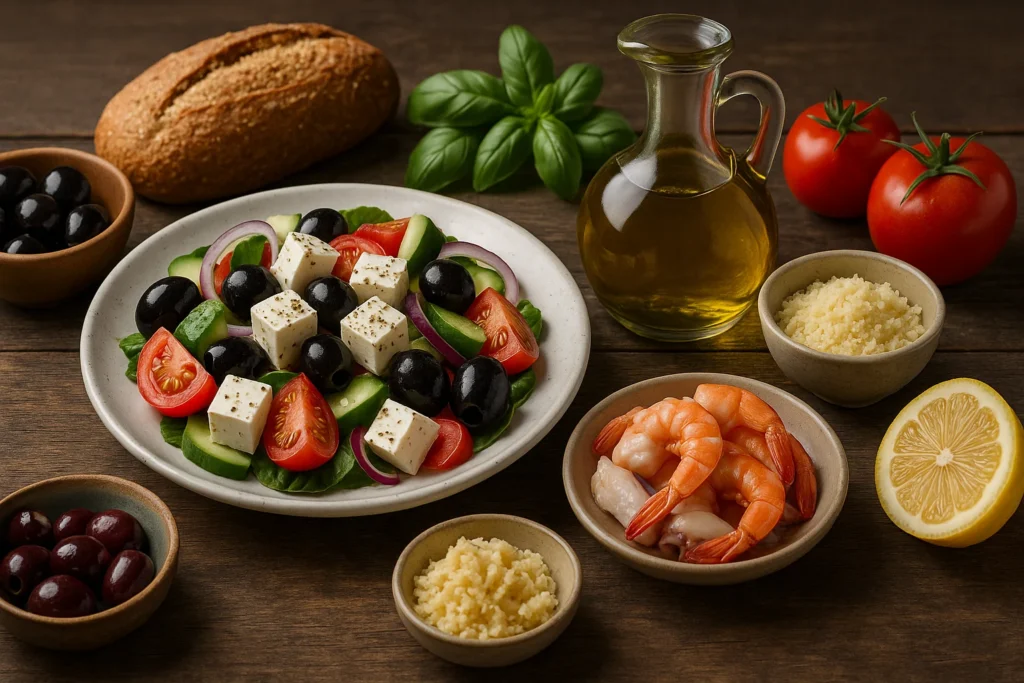The Historic Moment That Changed How We View Food Culture
On November 16, 2010, in a conference room in Nairobi, Kenya, history was made. Representatives from seven Mediterranean nations stood before UNESCO’s Intergovernmental Committee not to present an ancient monument or rare artifact, but something far more fundamental to human existence – their way of eating. When the committee announced its decision to inscribe the Mediterranean diet on UNESCO’s Representative List of the Intangible Cultural Heritage of Humanity, it marked a pivotal moment in global food culture.
This was no ordinary dietary pattern being recognized. UNESCO wasn’t simply acknowledging a list of healthy foods. The designation celebrated an entire way of life that had sustained civilizations around the Mediterranean basin for over 4,000 years. It honored a living tradition of communal meals, seasonal harvests, and the sacred ritual of breaking bread together that had been passed down through countless generations.
The decision represented a radical shift in how the world views food traditions, elevating the Mediterranean diet from a mere eating plan to a protected cultural treasure worthy of preservation alongside flamenco dancing and Japanese kabuki theater. But what exactly qualified this dietary pattern for such prestigious recognition? And why does this matter for people living far from the Mediterranean shores?
Deconstructing UNESCO’s Recognition: More Than Just a Diet
A Holistic Cultural Practice
UNESCO’s designation went far beyond acknowledging a collection of nutritious foods. The Mediterranean diet was recognized as:
- A social ritual centered on shared meals and conviviality
- A system of traditional knowledge encompassing farming, fishing, and food preparation
- A sustainable relationship between people and their environment
- A celebration of seasonal cycles and local biodiversity
- An oral tradition of recipes and techniques passed down through families
“The Mediterranean diet constitutes a set of skills, knowledge, rituals, symbols and traditions concerning crops, harvesting, fishing, animal husbandry, conservation, processing, cooking, and particularly the sharing and consumption of food.” – UNESCO Official Inscription
The Seven Living Repositories
UNESCO specifically identified seven communities across the Mediterranean basin as the standard-bearers of this tradition:
- Soria, Spain – Where the diet’s simplicity shines in dishes like gazpacho and pulse-based stews that have sustained shepherds for centuries
- Koroni, Greece – Home to ancient olive groves producing some of the world’s finest oil using methods dating back to Minoan civilization
- Cilento, Italy – A biodiversity hotspot preserving heirloom vegetables and traditional pasta-making techniques
- Chefchaouen, Morocco – Where vibrant spice markets and communal tagine cooking keep centuries-old traditions alive
- Brač, Croatia – Island community maintaining sustainable fishing practices and lamb-raising methods unchanged for generations
- Tavira, Portugal – Preserving salt-cod traditions that developed during the Age of Exploration
- Agros, Cyprus – Mountain village known for halloumi cheese production and rosewater distillation using medieval techniques
The Unsung Heroines: Women as Cultural Transmitters
A particularly significant aspect of UNESCO’s recognition was its emphasis on the crucial role of women in preserving and transmitting this culinary heritage. Across the Mediterranean, women have historically been the:
- Keepers of family recipes passed down orally from mother to daughter
- Experts in food preservation techniques like olive curing and sun-drying tomatoes
- Organizers of communal cooking for religious feasts and village celebrations
- Market traders negotiating the sale of homegrown produce and homemade cheeses
The Science Behind the Hype: Decades of Nutritional Research
Landmark Studies That Shaped Our Understanding
The Mediterranean diet’s health benefits have been documented through some of the longest-running and most rigorous nutritional studies ever conducted:
- The Seven Countries Study (1958-2013) – Pioneering research by Ancel Keys that first revealed Mediterranean populations had significantly lower rates of heart disease
- Lyon Diet Heart Study (1994-1999) – Demonstrated a 70% reduction in cardiovascular mortality among participants following a Mediterranean-style diet
- PREDIMED Trial (2003-2011) – Gold-standard study showing 30% reduction in cardiovascular risk among high-risk individuals
- NU-AGE Study (2011-2016) – Provided evidence of protective effects against cognitive decline and frailty in older adults
The Nutritional Components That Make It Work
- Olive Oil as the Cornerstone
- Rich in monounsaturated fatty acids (particularly oleic acid) and polyphenols
- Demonstrated anti-inflammatory and antioxidant properties
- Typical traditional consumption: 4-5 tablespoons daily as primary fat source
- Abundance of Plant Foods
- 6+ servings of vegetables daily, emphasizing leafy greens and nightshades
- 2-3 servings of fresh fruit, favoring local varieties like figs and citrus
- Whole grains (farro, bulgur, whole wheat) instead of refined carbohydrates
- Moderate Fish and Dairy Consumption
- Fatty fish (sardines, mackerel, anchovies) 2-3 times weekly for omega-3s
- Yogurt and cheese in moderation as calcium sources
- Eggs consumed regularly but not excessively
- Limited Meat Intake
- Red meat only a few times monthly, often as flavoring rather than main
- Poultry in moderate portions, typically free-range
- Legumes as primary protein source several times weekly
The Often-Overlooked Lifestyle Factors
What frequently gets lost in Western adaptations of the Mediterranean diet are the crucial lifestyle components that make it truly effective:
- Mindful Eating Practices – Meals as unhurried social occasions lasting hours
- Seasonality and Locality – Consuming foods at their nutritional peak from nearby sources
- Natural Physical Activity – Movement woven into daily life through walking, gardening
- Wine Culture – Moderate consumption (1-2 glasses/day) with meals, not binge drinking
- Stress-Reduction Rituals – Afternoon siestas, evening passeggiata (leisurely walks)
The Modern Threats: Challenges Facing the Tradition
The Fast Food Invasion and Changing Eating Habits
Traditional eating patterns are eroding at an alarming rate even in Mediterranean heartlands:
- Greece: Fast food consumption has increased 500% since 1990, with 34% of children now overweight
- Italy: 40% of families no longer eat lunch together daily, the traditional main meal
- Spain: Processed food sales have doubled since 2000, now accounting for 65% of calories
- Morocco: Soda consumption has tripled in 20 years, displacing traditional mint tea
Industrialization of Agriculture and Fishing
The very production systems that created the Mediterranean diet are disappearing:
- Olive Oil Production: Industrial high-density groves replacing traditional, biodiverse orchards
- Fishing Practices: Overharvesting and trawling threatening small-scale artisanal fisheries
- Crop Diversity: Commercial agriculture focusing on just 3 tomato varieties versus hundreds historically
- Wheat Cultivation: Modern high-yield strains replacing ancient, more nutritious varieties
The Climate Change Crisis
The environmental conditions that shaped the diet are undergoing dramatic changes:
- Rising Temperatures: Threatening olive and grape cultivation with heat stress
- Water Scarcity: Traditional dry farming becoming increasingly difficult
- Biodiversity Loss: Wild greens, herbs, and pollinators disappearing rapidly
- Soil Degradation: Intensive farming depleting soils that took millennia to form
Cultural Globalization and Generational Shifts
Younger generations are abandoning traditional ways:
- Urban Migration: Youth moving to cities lose connection to food production
- Time Poverty: Fewer people able to devote hours to meal preparation
- Globalized Tastes: Preference for processed convenience foods over traditional dishes
- Elder Knowledge: Cooking techniques and recipes disappearing with older generations
Bringing the Mediterranean Diet Home: Practical Adaptation for Modern Lives
Building the Mediterranean Pantry
Essential ingredients for any kitchen:
- Quality Olive Oil
- Look for cold-pressed, extra virgin with harvest date
- Store in dark, cool place to preserve antioxidants
- Use for cooking, dressings, even baking
- Whole Grains
- Farro, bulgur, freekeh, whole wheat pasta
- Experiment with ancient varieties like einkorn
- Soak or sprout for enhanced nutrition
- Legumes
- Lentils, chickpeas, cannellini beans
- Keep both dried and canned for convenience
- Learn traditional preparations like Italian pasta e fagioli
- Canned Fish
- Sardines, anchovies, tuna in olive oil
- Sustainable options with MSC certification
- Quick protein source for salads and pastas
- Dried Herbs and Spices
- Oregano, thyme, rosemary, sage
- Cumin, coriander, cinnamon for North African influence
- Buy whole and grind fresh for maximum flavor
Weekly Meal Framework
A realistic approach for busy modern schedules:
Breakfast Options
- Greek yogurt with honey, walnuts, and seasonal fruit
- Whole grain toast with olive oil, tomato, and oregano
- Vegetable omelet with feta and fresh herbs
Lunch Ideas
- Lentil soup with whole grain bread and olive oil drizzle
- Large salad with tuna, olives, feta, and chickpeas
- Whole wheat pita stuffed with grilled vegetables and tzatziki
Dinner Concepts
- Grilled fish with roasted vegetables and lemon
- Whole wheat pasta with garlic, oil, broccoli and anchovies
- Vegetable and bean stew with crusty bread
Snack Alternatives
- Handful of almonds or walnuts
- Fresh fruit with small piece of cheese
- Olives and whole grain crackers
- Hummus with vegetable sticks
The Social Component: Making Meals Meaningful
Practical ways to incorporate Mediterranean eating philosophy:
- Sunday Family Dinner – Designate one weekly meal for extended gathering
- Tech-Free Meals – Implement no-phone policy at the table
- Cooking Together – Involve family in meal preparation
- Community Potlucks – Organize monthly shared meals with friends
- Market Visits – Make food shopping a social experience
The Global Impact: Ripple Effects of UNESCO’s Decision
Policy Changes Across the Mediterranean
Since the 2010 designation, governments have implemented:
- Italy: Mediterranean diet education programs in schools nationwide
- Spain: Protected geographical indications for traditional foods
- Greece: Agritourism initiatives connecting visitors with small producers
- Morocco: Support for women’s cooperatives preserving food traditions
- Croatia: Sustainable fishing regulations to protect small-scale fleets
Scientific Innovations and Research
Researchers are applying Mediterranean principles to:
- Diabetes Prevention – Showing better glycemic control than standard low-fat diets
- Mental Health – Correlating diet with lower depression and anxiety rates
- Longevity Studies – Identifying specific biomarkers of healthy aging
- Microbiome Research – Exploring gut health benefits of traditional foods
- Cancer Prevention – Investigating protective effects against certain cancers
Culinary Diplomacy and Cultural Exchange
The Mediterranean diet has become:
- A model for sustainable food systems worldwide
- A bridge between cultures and religions around the Mediterranean
- A tool for intercultural dialogue and understanding
- A framework for discussing food security and nutrition policy
Preserving the Legacy: Current Conservation Efforts
Grassroots Movements and Local Initiatives
Community-based projects keeping traditions alive:
- Slow Food Presidia – Protecting endangered foods like Sicilian bush tomatoes
- Women’s Cooperatives – Maintaining artisanal cheese and bread making
- Seed Banks – Preserving heirloom varieties of grains and vegetables
- Farmers Markets – Revitalizing direct producer-consumer connections
- Cooking Schools – Teaching traditional techniques to younger generations
Policy Interventions and Government Support
Official actions supporting the diet’s preservation:
- School Lunch Reforms – Bringing traditional foods back to cafeterias
- Agricultural Subsidies – Supporting small-scale olive and grape growers
- Urban Planning – Creating spaces for farmers markets and community gardens
- Tourism Strategies – Promoting culinary heritage as cultural asset
- Research Funding – Supporting studies on traditional food systems
Technological Innovations for Tradition
Modern tools being applied to ancient practices:
- Blockchain Tracking – Ensuring olive oil authenticity from grove to table
- Climate-Resistant Crops – Developing drought-tolerant wheat varieties
- Sustainable Fishing Apps – Helping consumers choose responsibly caught seafood
- Digital Archives – Documenting traditional recipes and techniques
- E-Commerce Platforms – Connecting small producers with global markets
Living the Mediterranean Way: Personal Stories of Adaptation
Maria’s Journey: From Greek Village to American Suburb
Maria, who immigrated from a small Greek island to Chicago, shares her experience maintaining food traditions:
“At first, it was incredibly difficult. Everything in America was about speed and convenience. My children wanted packaged snacks, not olives and cheese. But I started small – planting basil and oregano in pots on my balcony, making big batches of tzatziki for my coworkers. Slowly, I found other Greek families and we began exchanging dishes. Now my book club meets in my kitchen, and we all cook together. That’s the real secret – it’s not about perfection, but connection. The food is just the vehicle.”
Chef Antonio’s Modern Interpretation
A Michelin-starred chef in Barcelona explains his contemporary approach:
“We respect tradition but don’t worship it blindly. In my kitchen, we might use Japanese knife skills on Mediterranean vegetables or modernist techniques with traditional ingredients. What matters is keeping the soul intact – seasonality, simplicity, sharing. I serve 20-course tasting menus, but at the end, we still bring out a big platter of grilled fish and vegetables for the whole table, just like my grandmother did. That’s the spirit that UNESCO recognized.”
The Future of Food Culture: Expanding the Model
Other Traditions Seeking Recognition
The Mediterranean diet’s UNESCO success has inspired other regions:
- Nordic Diet – Emphasizing seafood, berries, whole grains and foraging
- Japanese Washoku – Traditional dietary culture inscribed in 2013
- West African Cuisine – Plant-based traditions gaining research attention
- Andean Diet – Ancient grains and tubers with proven health benefits
- Southern US Soul Food – Reinterpreted for modern health consciousness
The Next Generation’s Reinterpretation
How young people are engaging with the tradition:
- Food Startups – Modernizing ancient fermentation techniques
- Social Media – #MediterraneanDiet has millions of posts showcasing adaptations
- Fusion Cuisine – Blending Mediterranean principles with global flavors
- Tech-Enabled Tradition – Apps teaching traditional cooking methods
- Sustainability Focus – Emphasizing the diet’s low environmental impact
Why This Matters More Than Ever
In an era of climate crisis, diet-related disease epidemics, and social fragmentation, the Mediterranean diet offers:
- A proven model for lifelong health and longevity
- A sustainable approach to food production and consumption
- A celebration of cultural identity and diversity
- A antidote to the isolation of modern eating habits
- A reminder of food’s power to connect us to nature and each other
As the late, great food writer Claudia Roden observed: “The Mediterranean diet isn’t just what people eat, but how they live. It’s a philosophy that recognizes food as culture, as pleasure, as community – not just fuel. When we lose these traditions, we lose part of our humanity.”
The UNESCO recognition ensures that as the world changes, this ancient yet timeless way of eating – and living – will endure for generations to come. Not as a museum piece, but as a living, evolving tradition that continues to nourish both body and soul.




Your point of view caught my eye and was very interesting. Thanks. I have a question for you. https://accounts.binance.com/tr/register?ref=MST5ZREF